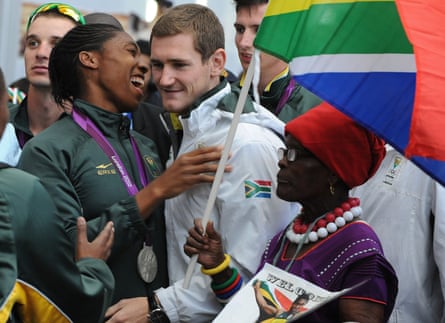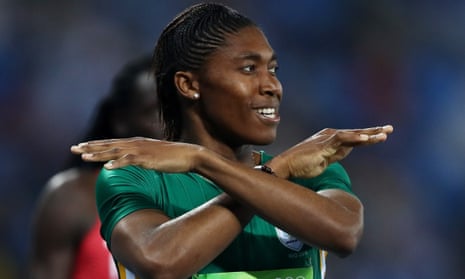When athletes lined up for the 800m women’s final in Rio last week they weren’t exactly starting from a level playing field – on that we can all agree. But who was it who enjoyed the “unfair advantage” that the eventual winner Caster Semenya has been accused of holding?
Various competitors and commentators have declared that the South African runner’s gold medal was unfairly gained because her physical attributes and medical condition make it impossible for others to beat her.
Lyndsey Sharp, the British runner who came sixth, tearfully announced that she hadn’t had a chance at victory after a decision by sports authorities not to force Semenya and other athletes with hyperandrogenism to take drugs to reduce their testosterone levels.
Paula Radcliffe explained why Sharp had been so upset. “However hard she goes away and trains, however hard Jenny Meadows goes and trains, they are never going to be able to compete with that level of strength and recovery that those levels of elevated testosterone brings,” she said.
Another Brit Sebastian Coe, head of the international athletics federation, said the organisation would continue to fight for a ruling to force athletes with hyperandrogenism to take drugs or have surgery – and is confident of succeeding.
Another British athlete tweeted: “Happy for Lynsey Sharp for coming 3rd in women’s 800m.” The tweet, which pointed to rumours that all three medal winners in the race have this so-called unfair advantage, has since been deleted.
Nevermind the fact that all Olympic athletes have varying degrees of physical advantage over each other and the rest of us, there are more significant inequalities that aren’t being talked about here. It is calmly accepted that athletes from large, rich countries enjoy benefits not available to those from poorer, smaller countries, and so will always dominate sporting competitions such as the Olympics.
The irony of athletes from Great Britain, which spent £275m on preparations for the Rio games, raising fundamental questions about fairness in a race against an athlete from a country that spent less than £1.9m has somehow been lost.

Semenya has been the object of a long and terrifyingly international campaign that has included the disclosure of private medical information and ongoing hounding by the media. She has refused to talk about the condition, saying only that “God made me the way I am and I accept myself”.
This silence is emblematic of the way in which athletes from poor countries seldom complain about the biggest elephant in the room when it comes to unfair advantage; that they are disadvantaged from the start.
In developing countries all aspects of sports are under-resourced. School programmes barely exist. Even elite athletes struggle to find a track to practice on or a coach to work with – never mind the sophisticated nutritional, psychological and biomechanical performance enhancement available to those in the developed world. Forget marginal gains, these are massive ones.
The idea that testosterone levels could constitute an unfair advantage in this climate is laughable.
Just look at the final medal table in Rio: the US got 121 medals; Team GB 67 medals; China 70, Russia 56 and Germany 42. Canada spent over C$5m for every medal won; while Australia spent A$330m over the last Olympic cycle.
Perhaps Sharp should reflect on the advantages she carried into that 800m race. Can there be any doubt that Semenya’s road to Rio was so much more arduous, demanding more training, talent and tenacity than her western rivals?
Sharp is right that the Olympic system needs to be re-examined, and there are a range of practices that British athletes can tackle in their crusade for fairness.
For example, blatant sexism continues to exist in the way the international sporting community operates. Male athletes with higher-than-normal naturally occurring levels of testosterone have not been subject to testing or complicated medical treatments in the way women have. Those concerned about Semenya’s ostensible advantages ignore this obvious double standard that demeans all female competitors.
The British athletes’ selective outrage over Semenya’s victory ignores the unfairness of their own situation. By cherry picking one form of advantage while being unprepared to recognise the myriad ways in which they themselves are privileged, athletes such as Sharp have chosen to portray themselves as victims – despite all the benefits of birth they have enjoyed.
Those who genuinely wish to see fairness in sports have to be prepared to stop focusing on individuals and take a closer look at inequalities that are built into the system. In the meantime, athletes like Semenya will continue to keep their eyes firmly on gold.
